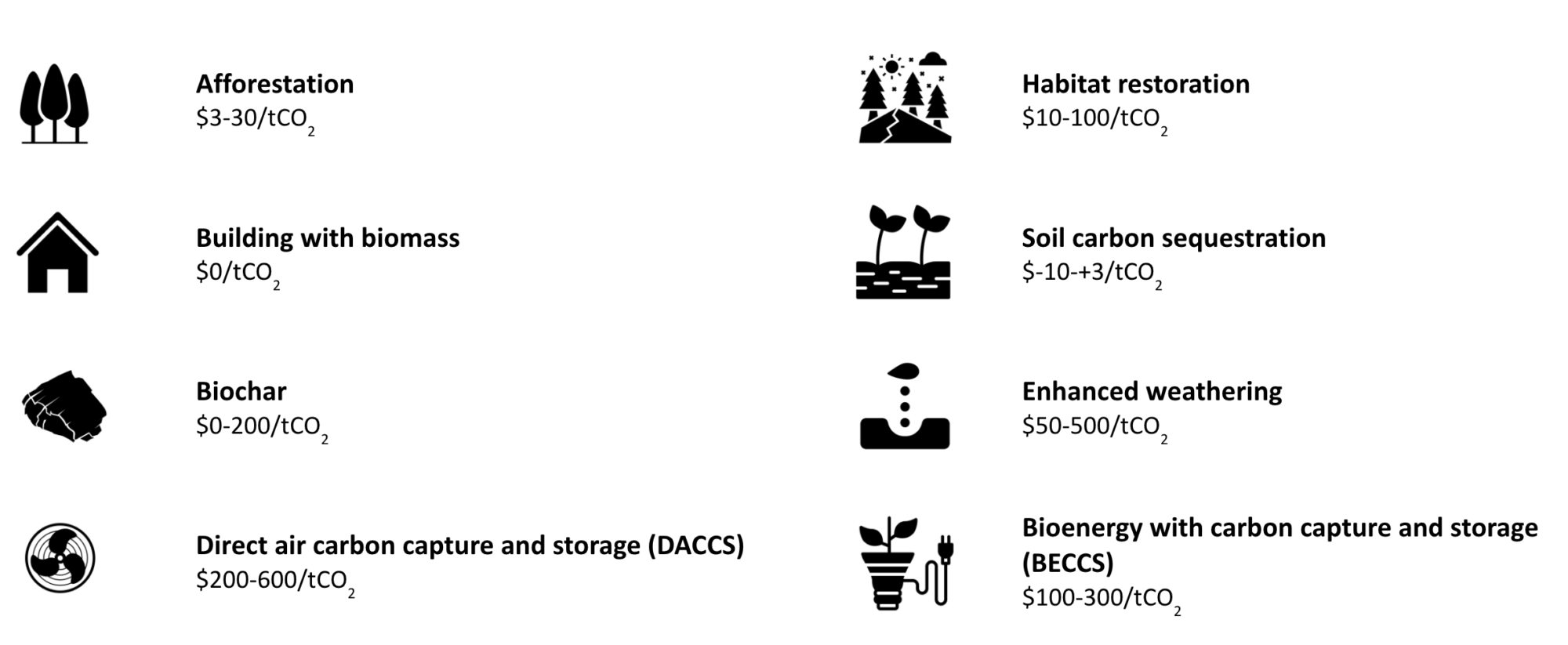greenhouse gas removal
innovation in greenhouse gas removal
To stabilise global temperatures, we need to achieve Net Zero – counteracting any remaining emissions of greenhouse gases into the atmosphere with an equivalent amount of Greenhouse Gas Removal (GGR). In order to cap the rise in global temperatures at 1.5°C above the pre-Industrial level it will be necessary to achieve Global Net Zero by 2050. This means that for every tonne of carbon dioxide that is emitted into the atmosphere in that year there will need to be a tonne of carbon dioxide permanently removed from the atmosphere.
GGR (also known as negative emissions) encompasses a wide range of proposed techniques to remove greenhouse gases from the atmosphere. While there are some proposed methods for removing greenhouse gases other than CO2, the vast majority of GGR methods involve the removal of CO2 from the atmosphere and its long-term storage so that it doesn’t find its way back into the atmosphere.
The range of proposed GGR techniques includes biological approaches, such as planting trees and increasing the amount of carbon stored in the soil, and engineered approaches, such as enhancing the rate at which certain minerals weather and devices that directly capture CO2 from the air. To assess how effective such techniques could be, it is necessary to understand how long-lasting the storage of CO2 away from the atmosphere is and to determine the social acceptability of deploying such techniques at scale.
To achieve the ambition of the Paris Agreement will require GGR techniques to be deployed at a vast scale. The exact amount of GGR required will depend on what the temperature goal is (more GGR will be required to achieve the 1.5°C goal than a 2°C goal), the rate of emissions reduction (the quicker we reduce emissions, the less GGR will be required to counter the remaining emissions) and climate sensitivity (more GGR will be required if the climate is more sensitive to increases in the amount of greenhouse gases in the atmosphere). Current estimates are that between 400-1600 billion tonnes of CO2 will need to be removed from the atmosphere during the course of the century.
There is a need to demonstrate whether proposed GGR techniques are effective and socially acceptable at a significant scale. This will require resources to research and develop proposed techniques, along with detailed consideration of the regulatory frameworks that need to be put in place to appropriately incentivise deployment.
Follow updates on this page for latest research on GGR.
greenhouse gas removal Projects
carbon engineering
Carbon Engineering uses Direct Air Capture (DAC) technology to capture carbon dioxide directly from the atmosphere.
Climeworks
Climeworks develops, builds and operates direct air capture machines to capture carbon dioxide directly from the air.
Options for Greenhouse Gas Removal

The Greenhouse Gas Removal Hub – CO₂RE
Funded through the UKRI SPF Greenhouse Gas Removal Demonstrators (GGR-D) Programme, CO2RE will co-ordinate the Programme and conduct solutions-led research to evaluate a balanced portfolio of economically, socially and environmentally scalable GGR options, with associated policy design, engagement and outreach. This will enable the UK to lead internationally on achieving global net–zero emissions, consistent with the Paris Agreement.
Other research themes
Nature-based Solutions
Nature-based Solutions (NbS) involve working with and enhancing nature to achieve multiple benefits for people, including removing CO2 from the air, and aiding adaptation to climate change.
Equity AND Inclusion
Pathways to achieving global net zero emissions must be framed by questions of equity and justice. A just transition to a net zero future needs to be inclusive of a range of actors as well as a range of views, including those relating climate justice.
Green Recovery and Resilience
A green recovery from COVID-19 could accelerate GDP growth in the immediate future, establish new industries and jobs for the coming decade, and deliver a sustainable climate for the next century.
News and Events

UK Government Voluntary Carbon and Nature Markets policy consolidates action on nature and climate, but risks compromising urgent mitigation of climate change and preventing and repairing nature loss, say ONZ researchers
Oxford, 23 June 2025 Researchers from the Leverhulme Centre for Nature Recovery, Oxford Net Zero and Oxford Sustainable Finance Group have submitted feedback to the UK Government’s ‘Voluntary Carbon and Nature Markets: Raising Integrity’ ... Read more

Job opening: Serviced Emissions Research & Engagement Manager
The Oxford Net Zero Engagement Team is recruiting for a Serviced Emissions Research & Engagement Manager. This pivotal role will lead a high-impact initiative focused on advancing the understanding and integration of “serviced emissions” ... Read more

New Oxford Report: Carbon Capture and Storage Without Taxpayer Billions Is Possible
Oxford Net Zero and Carbon Balance researchers reveal the risks of the current UK CCS policy mix and explore how a carbon storage mandate on fossil fuel producers could help the UK meet its climate targets while protecting public finances A ... Read more

Oxford Net Zero partners with AXA XL on research in India, Mexico and Kenya
Oxford Net Zero is excited to announce that it is working with the insurance company AXA XL, the Institute for Science, Innovation and Society (InSIS), and the Smith School of Enterprise and the Environment to conduct research on private sector ... Read more

Finance, Fossil Fuels and $10 coffee: Reflections on COP29
As we begin a new year, Oxford Net Zero looks back on the highs and lows of November's climate summit in Baku. In some ways, this COP was different. The venue was smaller than in previous years, which meant that attendees could have genuine ... Read more

Oxford Net Zero announces affiliation with Reuben College
Oxford Net Zero is pleased to announce an affiliation with Reuben College. This new strategic partnership will allow us to collaborate more closely on environmental change, which we are both working to address as a core objective. Professor ... Read more
See more news and events
